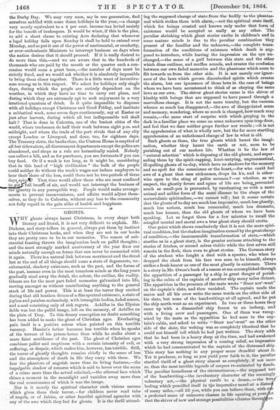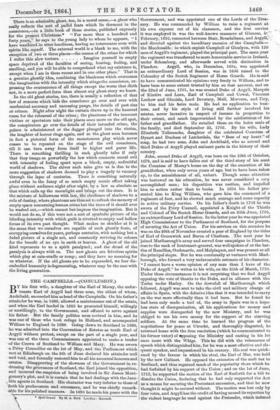GHOSTS.
the real countenance of which it was the image. voluntary act, —the physical result to a dream, — the fore
Nor is it merely the spiritual character such visions assume boding which pencilled itself in tile imperative mood at a dista which gives them their terror, — for children never read tales of many miles,—all fill you, while you can believe them, with of angels, or of fairies, or other fanciful spiritual agencies with a profound sense of unknown chasms in life opening at yourIet any of the awe which they feel for ghosts. It is the thrill attend- that the shiver of new and strange possibilities vibrates tbrou ou.
the Derby Day. We may very soon, say in one generation, find ing the supposed change of state from the bodily- to the phantas- ourselves saddled with some dozen holidays in the year,—a change mal which strikes them with alarm,—not the spiritual state itself, very nearly equivalent to a 4 per cent. income-tax levied mainly which for beings created and known only under -that form of for the benefit of innkeepers. It would be wiser, if this is the plan, existence would be accepted as easily as any other. The to add a short clause to existing Acts declaring that whenever peculiar shrinking which ghost stories excite in children's and in a legal holiday falls upon Sunday it shall be held to extend over some mature minds is due to the peculiar combination they Monday, and so put it out of the power of sentimental, or crochetty, present of the familiar and the unknown,—the complete trans- or over-enthusiastic Ministers to interrupt business on days when formation of the conditions of existence which death is sup
the nation desires that it should proceed. If it is really desired to posed to introduce, while leaving the impression on the eye un- do more than this,—and we are aware that to the hundreds of changed,—the sense of a gulf between this state and the other thousands who are paid by the month or the quarter such a con- which dims outlines, and muffles sounds, and creates the confusion cession would seem a great boon,—the number of days must be between our own faded memories and the phantoms which seem to strictly fixed, and we would ask whether it is absolutely impossible flit towards us from the other side. It is not merely our ignor- to bring them closer together. There is a little want of inventive- ance of the laws which govern disembodied spirits which creates new among us in this respect. We select for holidays only single the alarm, but our ignorance of those laws in the case of beings days, during which the people are entirely dependent on the whom we have been accustomed to think of as obeying the same weather, in which they have no time to carry out plans, and laws as our own. The shiver ghost stories cause is the shiver of during which they are extremely apt to seek enjoyment in a very kinship with beings that axe supposed to have passed through a irrational quantum of drink. Is it quite impossible to dispense marvellous change. It is not the mere tenuity, but the vacuum with all holidays except Christmas and Good Friday, and institute whence so much has disappeared,—the awe of disappointed sense a sabbatical week, some seven days continuously, say at Easter or and memory, wondering, where so much is changed, how much may just after harvest, during which all but indispensable toil shall remain,—the same start of surprise with which groping in the halt ? That is done in Calcutta, one of the busiest cities of the dark in a familiar place we come on some unknown open trap-door, world, where tradesmen do half their work between eight p.m. and and feel that we dare neither grope further nor recede ;—it is not midnight, and where the trade of the port rivals that of any city the apprehension of what is wholly new, but the far more startling except London or Liverpool, and done, too, for eighteen days. apprehension of an unfathomed change of law in what is old.
ao much less serious, much less remorseful, much less dramatic, much less human, than the old ghosts of whom we have been There is an admirable ghost, too, in a moral sense,—a ghost who really reflects the sort of pallid fears which lie dormant in the conscience,—in a little book of these stories, published expressly for the present Christmas.* "For more than a hundred and forty years," he says to the young lady to whom he appears, "I have wandered in utter loneliness, having no intercourse even with spirits like myself. The external world is a blank to me, with the exception of two or three places—the scenes of the crime for which
I suffer this slow torture Imagine yourself in empty space deprived of the faculties of seeing, hearing, feeling, and smelling, and you will be able to comprehend what my existence is, except when I am in these rooms and in one other place." That is a genuine ghostly idea, combining the blankness which overcomes the imagination with the intensity which stings the conscience, ex- pressing the evanescence of all things except the worm that dieth not, in a more perfect form than almost any ghost story we know.
In the old ghost stories, too, there is usually a reflection of that law of remorse which bids the conscience go over and over with mechanical accuracy and unceasing pangs, the details of past sins or crimes. Night after night the curtain draws up in the haunted room for the rehearsal of the crime ; the phantoms of the innocent victims or spectators take their places once more on the old spot, the conspirators go over the details of their intended crime, the poison is administered or the dagger plunged into the victim, the laughter of horror rings again, and so the ghost soon becomes in fact a pictorial form of the monotonous play which never ceases to be repeated on the stage of the evil conscience, till it can turn away from itself to higher and purer life. There is something thrilling in such ghostly tales if only that they image so powerfully the law which connects moral evil with intensity of feeling spent upon a blank, empty, unfruitful world of shadows. The shiver such tales give us is due to the mere suggestion of shadows doomed to play a tragedy to vacancy through the lapse of centuries. There is something naturally awful even in the fancy of so much empty scenic effect taking place without audience night after night, by a law as absolute as that which calls up the moonlight and brings out the stars. It is the mixture of hollowness with law, the obedience of shadows to a rule of destiny, where phantoms are thus set to refresh the memory of empty space concerning human crime lest the trace of it should ever be washed out,—which cannot but impress the imagination. But it would not do so, if this were not a sort of symbolic picture of the blinding intensity with which guilt is rivetted to empty and hollow forms of its own past thought. What makes us shudder at it is the sense that we ourselves are capable of such ghostly feats, of occupying ourselves for years, perhaps centuries, with nothing but a faded picture of a single act, and constantly reviving its colours for the benefit of no eye in earth or heaven. A ghost of the old kind represents to us a spirit paralyzed ; and the dread of the paralysis is always with us. The new ghosts are frivolous spirits winch play at cats-cradle or romp ; and they have no meaning for us whatever. If the old ghosts are to be superseded, we fear dis- embodied humanity is degenerating, whatever may be the case with the living generation.































 Previous page
Previous page